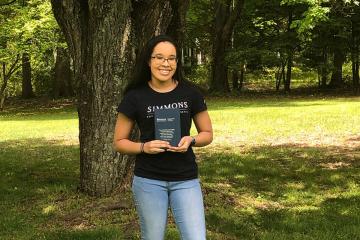Dr. John Reeder feels lucky to be a psych professor at Simmons. He grew up in Greater Boston, but his studies took him to McMaster University in Canada, then Princeton, then University of Massachusetts, then the University of Wisconsin. After all those years at big research institutions, it felt right to return home and join Simmons in 2004. Here he discovered how rewarding it is to teach in a small liberal arts program, especially since his field of cognitive psychology is the most interesting topic that anyone could ever study. It's relevant to everything!
Education
- PhD, Psychology, from Princeton University (2000)
- BA, Psychology, from McMaster University (1991)
Courses
- PSYC 203 Research Methods in Psychology (with lab)
- PSYC 243 Cognitive Psychology
- PSYC 245 Learning and Conditioning
- PSYC 345 History and Systems of Psychology
Research/Special Projects
As a cognitive psychologist, Dr. John Reeder studies the science of mental processes, especially memory, and perception. For example, reality monitoring is our ability to distinguish between memories for perceived and imagined events. Some of his research concerns biases in that process, showing how so-called "false memories" aren't really false at all; they reflect the misattribution of true information to the wrong source. He also is interested in working memory, the system that produces our stream of thought. Dr. Reeder and his collaborators have observed how specific brain structures select and maintain the information we're thinking about, but less efficiently as we age. He has been examining a profound mystery of consciousness: the perception of time. We know it's affected by perceptual and emotional factors, but what about conceptual ones like the semantic relatedness of our thoughts? His latest findings suggest that experiences seem to last longer when we're making meaningful connections.
Publications/Presentations
Reeder, J. A. (2022, November 17-20). Semantic association increases the subjective duration of word pairs [Poster Session]. Psychonomic Society 63rd Annual Meeting, Boston, MA, United States.
Raye, C. L., Mitchell, K. J., Reeder, J. A., Greene, E. J., & Johnson, M. K. (2008). Refreshing one of several active representations: Behavioral and fMRI differences between young and older adults. Journal of Cognitive Neuroscience, 20, 852-862.
Rotello, C. M., Macmillan, N. A., Reeder, J. A., & Wong, M. C. (2005). The "remember" response: Subject to bias, graded, and not a process-pure indicator of recollection. Psychonomic Bulletin & Review, 12, 865-873.
Rotello, C. M., Macmillan, N. A., & Reeder, J. A. (2004). Sum-difference theory of remembering and knowing: A two-dimensional signal detection model. Psychological Review, 111, 588-616.
Johnson, M. K., Reeder, J. A., Raye, C. L., & Mitchell, K. J. (2002). Second thoughts versus second looks: An age-related deficit in reflectively refreshing just-activated information. Psychological Science, 13, 64-67.
Raye, C. L., Johnson, M. K., Mitchell, K. J., Reeder, J. A. & Greene, E. J. (2002). Neuroimaging a single thought: Dorsolateral PFC activity associated with refreshing just-activated information. NeuroImage, 15, 447-453.
Professional Affiliations & Memberships
- The Association for Psychological Science
- The Psychonomic Society
Awards
- Toby M. Sloane Award for Student Centeredness in Teaching (2022)
- Excellence in Undergraduate Advising, Simmons College (2011)
- Book of the Year, American Journal of Nursing (co-authored chapter in Teaching Strategies for Health Education and Health Promotion, 2009)
- Professor of the Year, Simmons College (2007)
- Excellence in Teaching, University of Wisconsin-Stevens Point (2004)

